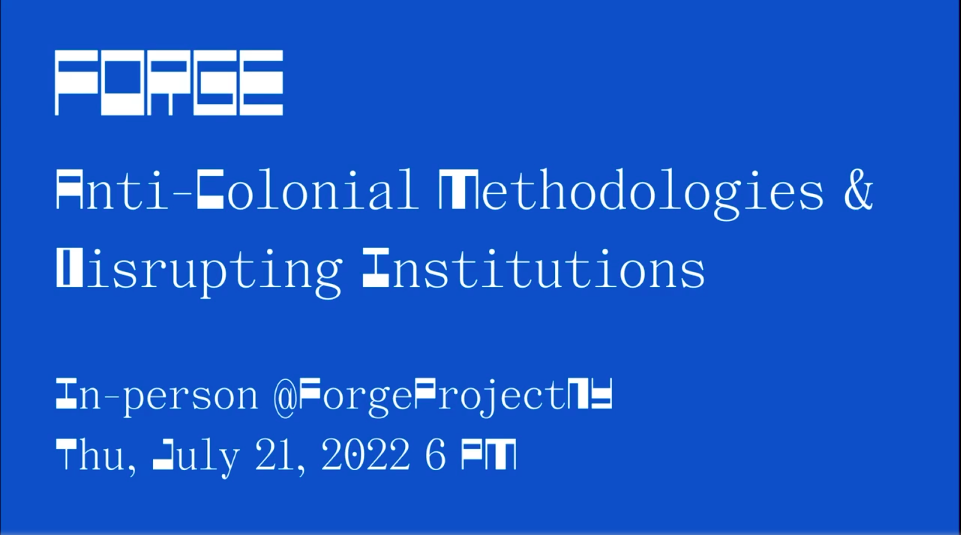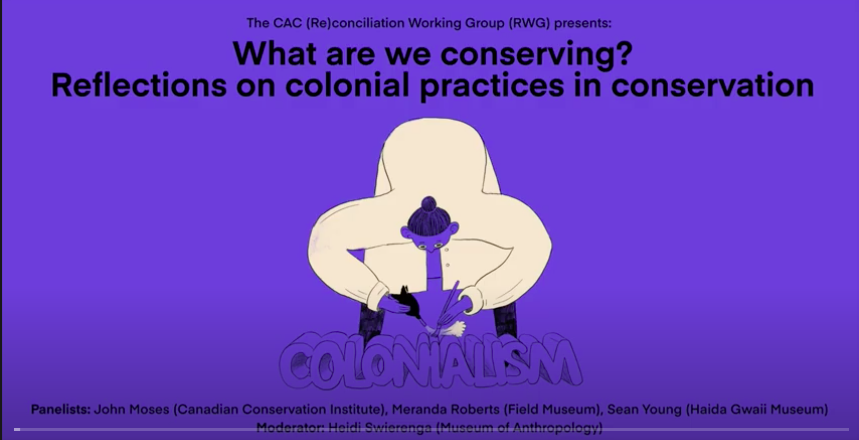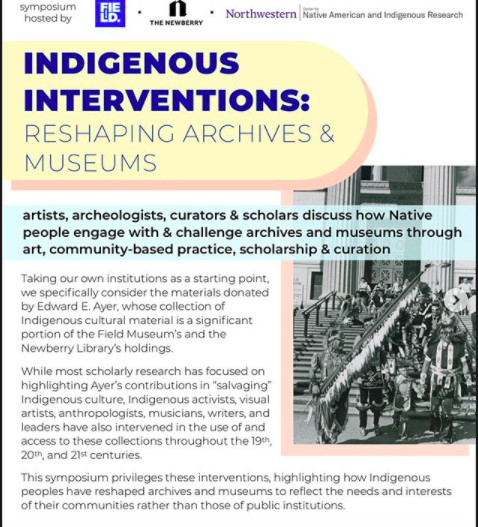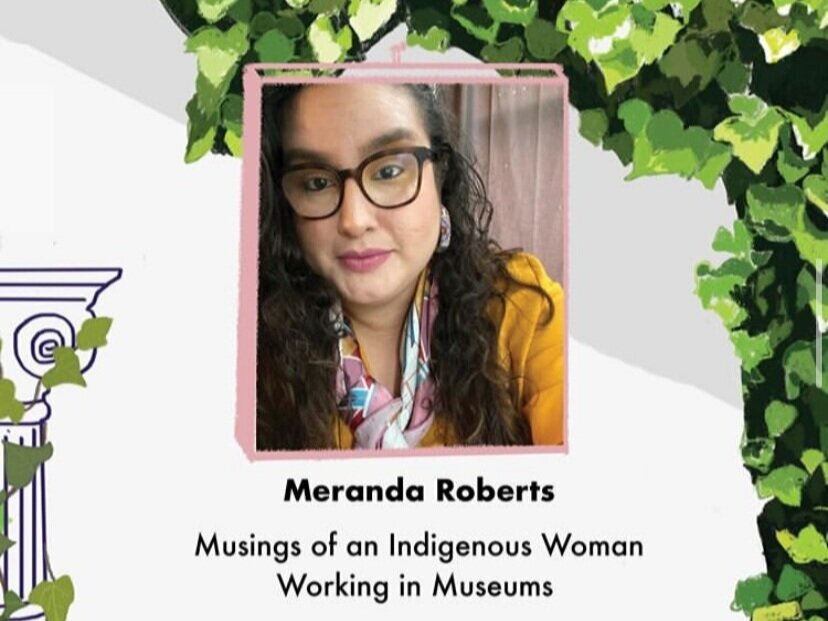Professional Talks
Thank you for taking the time to listen to my talks and to learn from my experiences. I share so openly because I really want to see institutions (and the people who work in them) grow. There is so much hope in the future and I want people to know that I believe in that beautiful tomorrow. At the same time, I work independently at the moment and believe in the act of reciprocity. If you have have learned something from my talks, and/or feeling generous, please consider sending donations to my venmo @Meranda-R or paypal @MerandaRoberts
Curating Equity in Museum Spaces - How My Museum Work is an Act of Institutional Critique
-
Dr. Meranda Roberts presented during Idyllwild Arts Native American Festival Week.
“Native American Arts Program at Idyllwild Arts aspires to be a leader in advancing, teaching and promoting Indigenous Arts at Idyllwild Arts Academy and Summer Program. Building on our historic engagement with Native American artists and scholars, we are excited by the new opportunity to grow and expand year-round opportunities in learning for all. Indigenous teaching artists, traditional knowledge bearers, and scholars have the opportunity to cross-pollinate their creative talents and develop their craft, thus identifying new ways to contribute to a global art community through education. The spirit of this work now lives year-round and is at the heart of the truly unique experience of shaping global citizen artists at Idyllwild Arts.
The Native American Arts Program serves the Summer Program through organizing Native American Arts Summer Workshops and curating, each year, a week of Native American Arts Programs (Festival Week) that bring together distinguished artists, scholars, and cultural specialists who present performances, demonstrations, films, and the Michael Kabotie Lecture Series. The spirit of the yearly festival remains, in bringing together the scientific, intuitive, and trickster voices for a balanced and provocative learning experience. It is designed to enhance and add depth to the workshop experience.”
Anti-Colonial Methodologies and Disrupting Institutions
—
Forge Project hosted a talk and conversation with Meranda Roberts (Northern Paiute and Chicana) and Kite (Oglala Lakota) on Indigenous research methodologies and ways of knowing, and how those anti-colonial frameworks can disrupt institutional knowledge keeping, in conservation and preservation but also in archives and collections management, curation and installation design, artist and community collaborations, and even accompanying text and publications.
Meranda Roberts (@curatorialkilljoy) is an enrolled member of the Yerington Paiute Tribe in Nevada, as well as Chicana. In 2018, she earned her PhD from the University of California, Riverside in Native American History. She has worked as a co-curator at the Field Museum of Natural History, where she developed content for the renovation of the museum’s seventy-year-old Native American exhibition hall, now titled “Native Truths: Our Stories. Our Voices.” She is also the co-host for the award-winning podcast “Exhibiting Kinship” and is currently an independent museum consultant. Meranda also served on the 2022 Forge Project Fellowship selection jury.
Meranda’s passion lies in holding colonial institutions, like museums, accountable for the harmful narratives they have painted about Indigenous people. She is also dedicated to reconnecting Indigenous collection items with their descendants. Through the use of Indigenous methodologies, as well as public history pedagogy, Meranda examines the harm colonialism continues to inflict on Indigenous communities and how public institutions can correct these wrongs.
Kite aka Suzanne Kite (@kitekitekitekitekite) is an Oglala Lakota performance artist, visual artist, and composer raised in Southern California. Kite has an MFA from Bard College’s Milton Avery Graduate School, and is a PhD candidate at Concordia University, Research Assistant for the Initiative for Indigenous Futures, and was a 2019 Trudeau Scholar.
Her research is concerned with contemporary Lakota ontologies through research-creation, computational media, and performance practice. Recently, Kite has been developing a body interface for movement performances, carbon fiber sculptures, immersive video & sound installations.
Bringing Accountability to Museums
—
Meranda’s passion lies in holding colonial institutions, like museums, accountable for the harmful narratives they have painted about Indigenous people. She is also dedicated to reconnecting Indigenous collection items with their descendants. Through the use of Indigenous methodologies, as well as public history pedagogy, Meranda examines the harm colonialism continues to inflict on Indigenous communities and how public institutions can correct these wrongs. Meranda’s passion lies in holding colonial institutions, like museums, accountable for the harmful narratives they have painted about Indigenous people. She is also dedicated to reconnecting Indigenous collection items with their descendants. Through the use of Indigenous methodologies, as well as public history pedagogy, Meranda examines the harm colonialism continues to inflict on Indigenous communities and how public institutions can correct these wrongs.
Unsettled: Indigenous Representation in Colonial Institutions
—
What role and responsibility do cultural and post-secondary institutions have in the telling of Indigenous peoples' stories? Who exactly should be involved in the telling of these stories? How BIPOC communities and narratives are reflected and represented by colonial institutions shapes how society views people of colour and how people of colour see themselves. Throughout the past year, cultural and post-secondary institutions around the globe have expressed messages of solidarity with BIPOC communities. To carry that energy forward and to back it up with further meaningful action, external shifts to more inclusive programming need to be combined with internal changes in hiring practices and leadership. Institutions need to speak to multiple communities in equitable ways. We’re at a time of cultural reassessment when so many of us are reexamining prevalent attitudes, perspectives, and our own biases. This event will explore how Indigenous communities can be better represented by cultural and post-secondary institutions and examine the responsibility we all have in achieving equity and inclusivity. This roundtable discussion is actively moderated by Elaine Alexie, curator, Indigenous Studies at the Royal Alberta Museum with panelists Dr. Paul Gareau (Métis), Assistant Professor, Faculty of Native Studies, University of Alberta; Felicia Garcia (Samala Chumash), Curator of Education, Indian Arts Research Center, School for Advanced Research in Santa Fe; and Dr. Meranda Roberts (Yerington Paiute/Chicana), post-doctoral researcher at the Field Museum, Chicago, IL.
What Are We Conserving? Reflections on Colonial Practices in Conservation
—
The (Re)Conciliation Working Group (RWG) of the Canadian Association for Conservation (CAC) presents a panel discussion with Sean Young (Haida Gwaii Museum), Meranda Roberts (Field Museum), and John Moses (Canadian Conservation Institute), with moderation by Heidi Swierenga (Museum of Anthropology, UBC). In this discussion we hoped to confront the colonial biases that exist in the conservation profession by examining the basic role of values in conservation decision-making. Who gets to make conservation decisions? Whose interests are preserved? And how can we shift our priorities to open up new possibilities for our conservation practice?
Centering Indigenous Voices in Historic House Museums
__
Join moderator Dr. Meranda Roberts and panelists, Heather Bruegl, Cinnamon Catlin-Legutko, Meghanlata Gupta, Annalisa Heppner, and Dr. Noel Lopez for a discussion of decolonial practice in historic house museums.
Image: “Spirit of Kithawa," 2019 by Chris Pappan (Kanza), used with artist’s permission. for the cover art of this conference discussion
We Are All on Native Land: A Conversation about Land Acknowledgments
—
Celebrate Indigenous Peoples’ Day with an online panel of Native speakers and experts. Indigenous Peoples’ Day honors the Native American community, their vibrant culture, and deep ties to land.
Join Debra Yepa-Pappan (Jemez Pueblo/Korean), the Field Museum’s Community Engagement Coordinator for the Native North America Hall, in conversation with: Heather Miller (Wyandotte), Executive Director of the American Indian Center of Chicago Felicia Garcia (Samala Chumash), Curator of Education, Indian Arts Research Center, School for Advanced Research in Santa Fe, Meranda Roberts (Yerington Paiute/Chicana), post-doctoral researcher at the Field Museum.
Together they’ll discuss the custom of land acknowledgments; their importance, complexities, and evolution; and what actions can follow a land acknowledgment.
Indigenous Interventions: Reshaping Archives and Museums
Link is to the entire first panel featuring me and my colleagues.
—
co-hosted by the Field Museum, Northwestern University, and the Newberry in which artists, archeologists, curators, and scholars will discuss how Native people engage with and challenge archives and museums through art, community-based practice, scholarship, and curation.
Taking the hosting institutions as a starting point, participants will specifically consider the materials donated by Edward E. Ayer, whose collection of Indigenous cultural material is a significant portion of the Field Museum’s and the Newberry Library’s holdings.
While most scholarly research has focused on highlighting Ayer’s contributions in “salvaging” Indigenous culture, Indigenous activists, visual artists, anthropologists, musicians, writers, and leaders have also intervened in the use of and access to these collections throughout the 19th, 20th, and 21st centuries.
This symposium privileges these interventions, highlighting how Indigenous peoples have reshaped archives and museums to reflect the needs and interests of their communities rather than those of public institutions.
Musings of an Indigenous Woman Working in Museums
(talk begins around 1:46:54)
—
I discuss the ways in which museums remain harmful to BIPOC, internally and externally, as well as what these institutions need to do to move forward to be more inclusive; and if decolonization is even possible.
Harvard Indigenous Design Collective: "Acknowledging Land.”
On November 25, 2020, the Harvard Indigenous Design Collective (HIDC) hosted "Acknowledging Land" which was a presentation on the significance of Land Acknowledgments in colonial spaces.








